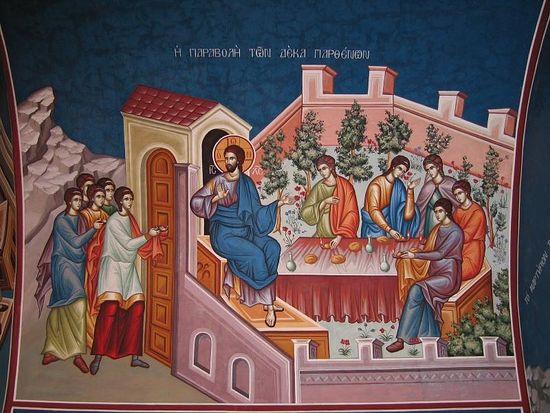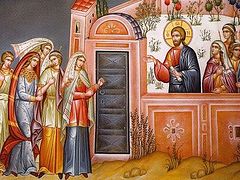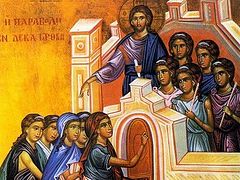Dear brothers and sisters, drawing near to the days of His passion, the Lord was especially close and candid with His disciples. Henceforth I call you not servants; for the servant knoweth not what his lord doeth: but I have called you friends; for all things that I have heard of my Father I have made known unto you (Jn. 15:15), said the Savior to the apostles. He no longer secretly, but now with special clarity, announced to them that He had to suffer, so as to prepare them for His suffering: Ye know that after two days is the feast of the passover, and the Son of man is betrayed to be crucified (Mt. 26:2). Seeing grief engulfing the apostles, He comforted His disciples with the promise that He would not leave them.
And moreover, the Lord did not conceal that the same fate that their Divine Teacher suffered awaited them also, and all Christians in general: Remember the word that I said unto you… If they have persecuted me, they will also persecute you; if they have kept my saying, they will keep yours also… If the world hate you, ye know that it hated me before it hated you. If ye were of the world, the world would love his own: but because ye are not of the world, but I have chosen you out of the world, therefore the world hateth you (Jn. 15:20, 18-19).
And again, seeing them sorrowful, the Lord comforted them: In the world ye shall have tribulation: but be of good cheer; I have overcome the world… And I will pray the Father, and he shall give you another Comforter, that he may abide with you for ever… and, lo, I am with you always, even unto the end of the world… Peace I leave with you, my peace I give unto you… Let not your heart be troubled, neither let it be afraid (Jn. 16:33; 14:16; Mt. 28:20; Jn. 14:27).
The Lord asks His disciples to abide in Him and fulfill His commandments, for without Him they cannot do anything: Abide in me, and I in you. As the branch cannot bear fruit of itself, except it abide in the vine; no more can ye, except ye abide in me… If ye abide in me, and my words abide in you, ye shall ask what ye will, and it shall be done unto you… I go to prepare a place for you. And… I will come again (Jn. 15:4, 7; 14:2, 3).
The Lord comforted them, revealing that after sorrow follows joy, and that a reward is prepared for them in the future Kingdom. And, inasmuch as His disciples were interested in the question of how the Lord’s Second Coming to earth would be, the Savior proclaimed to them the Divine truth, that at the end of the world He will come with great glory to judge the living and the dead and all those believers who abided in Him sincerely and with repentance until the end of their lives will be vouchsafed His Kingdom, while the unbelieving and apostates, abiding without repentance until the end of their lives, will be condemned to eternal torment.
When will this be, His disciples asked (Mt. 24:3). But the Lord answered them that of that day and hour knoweth no man, no, not the angels of heaven, but my Father only (Mt. 24:36). Thus, Holy Scripture preserves in deep mystery and does not reveal the precise time of the Second Coming, so that we would always keep ourselves in purity and chastity and would be prepared to meet the Lord at any time.
Therefore, the Lord admonishes His disciples: Watch therefore: for ye know not what hour your Lord doth come… And as it was in the days of Noe, so shall it be also in the days of the Son of man. They did eat, they drank, they married wives, they were given in marriage, until the day that Noah entered into the ark, and the flood came, and destroyed them all… Even thus shall it be in the day when the Son of man is revealed. Watch therefore (Mt. 24:42; Lk. 17:26-27, 30; Mt. 25:13).
Now more than ever we must remember this admonishment, for especially now many are dormant and sleeping. The sleep of the soul is not bodily sleep, which strengthens the body, but rather, it is an unhealthy sleep, a painful slumber in which people chase after vanity, thinking they are living a true life, forgetting about the soul, about God, and about the future eternal life. In order to more deeply imprint in us a sense of danger, the necessity of vigilance, and to rouse our consciences from spiritual slumber, the Lord told the parable of the ten virgins, which we heard in today’s Gospel reading.
This parable teaches us, having received the faith, to accompany it with good deeds, which only our spiritual life can sustain. The foolish virgins, going out to meet the Bridegroom, did not prepare their lamps with the oil of good deeds. Together with their lamps, the wise virgins stored up good deeds so as to worthily meet the Bridegroom. Thus, our whole life should be a preparation for our meeting with the Lord, and for this, we must throughout our entire life ceaselessly care for the acquisition and preserving of living faith and fervent love for God, the Source of love, and for others.
The cares of this world obscure the most essential care and purpose of life—illumination with the light of Christ, salvation, and preparation for the eternal Kingdom. Let us be sober, to enter into the Heavenly Bridechamber with the wise virgins and be accounted worthy of eternal blessings from the Lord. Amen.




